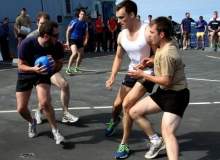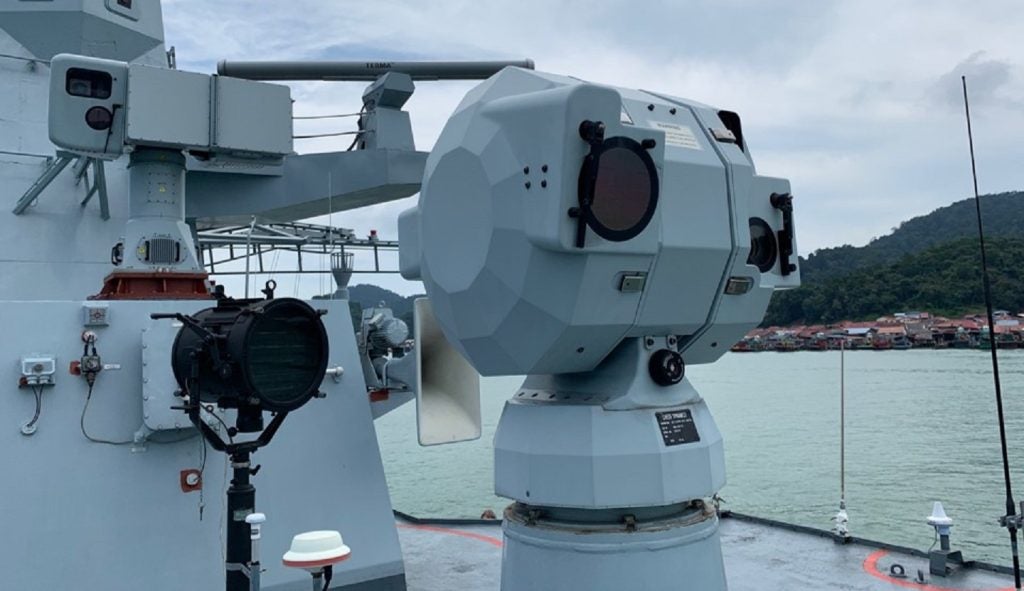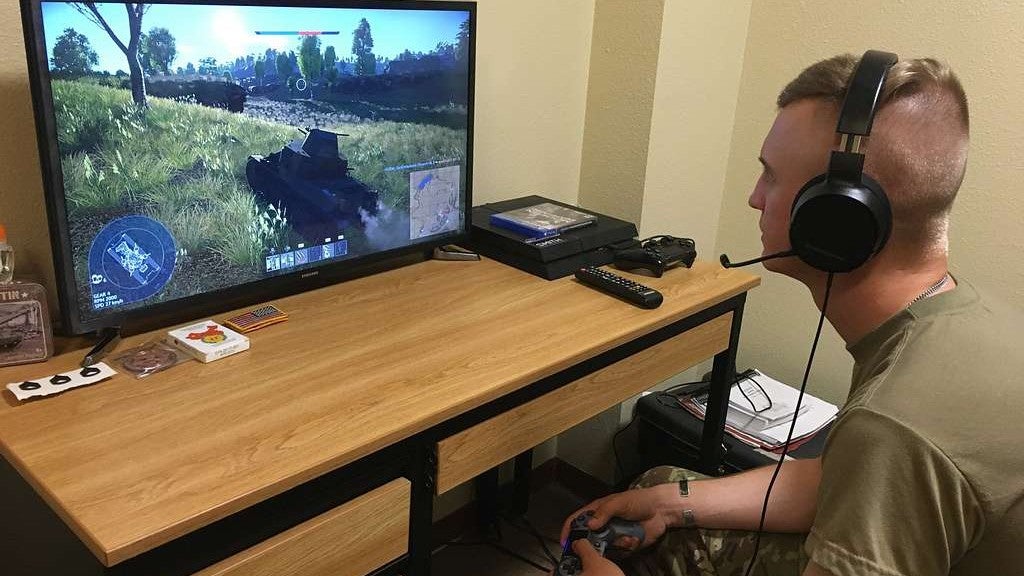

Surface vessel spare time
Lieutenant Commander Andy Bray is a logistics and public relations officer who has served in the Royal Navy for more than twelve years having joined the service at 18. He is currently deployed aboard HMS Dragon (D35), a Type 45 Daring-class air-defence destroyer that was commissioned in April 2012.
Dragon is currently at sea completing the Atlantic Patrol Task (South), as part of the Royal Navy’s standing commitment to provide maritime security in the region, patrol and visit UK territory and strengthen relationships within the region. This deployment will last six to seven months, which is about average, with semi-regular port stops.
“It can be three to four weeks between stops, but a ship of Dragon’s size can go for much longer,” says Bray. “A warship works a small town really so there is the opportunity for days off between stops, but obviously not for everyone at the same time.”
For those not on watch, a typical working day is much like that for office workers; around 8am to 5pm, with a few hours’ downtime.
“From the team on the bridge, engine rooms and radar masts the ship is like New York – it never sleeps,” says Bray. “So where we can we try and relax our routines on a Saturday and Sunday but there are always people on watch.”
The Royal Navy prides itself on the facilities it provides on ships, including a weights and cardio gym, access to the Internet, games consoles in the mess decks – which act as social areas – a library of books and television provided via satellite by the British Forces Broadcasting Service (BFBS).
How well do you really know your competitors?
Access the most comprehensive Company Profiles on the market, powered by GlobalData. Save hours of research. Gain competitive edge.

Thank you!
Your download email will arrive shortly
Not ready to buy yet? Download a free sample
We are confident about the unique quality of our Company Profiles. However, we want you to make the most beneficial decision for your business, so we offer a free sample that you can download by submitting the below form
By GlobalDataBut when ships are hundreds, if not thousands, of miles from home, some technology can be unreliable. There are occasional TV black spots, and Internet is not broadband quality – ruling out online gaming – but it is reliable enough to allow personnel to email their loved ones. Service personnel deployed on operations are also entitled to 30 minutes a week to telephone home.
“It is important to remember that life at sea can mean times of little connectivity but that is part of naval service and the bond that links our sailors and marines together,” says Bray.
Sailors can also bring their own private tablets and computers on board to entertain them, although across the Ministry of Defence some of the web is not accessible for use by all military staff for obvious security reasons.
“These days most people top up their e-readers and computers with downloaded movies to watch in their own time when at sea,” says Bray. “BFBS still provide a great catch-up service and send recorded TV programmes out to the ships so we can play them on the ship’s internal TV system – so if you like Top Gear or Hollyoaks you won’t miss out in the navy!”
When lying on your bunk watching films becomes lonely, there are plenty of team activities to being everyone together. One of Bray’s favourites is a game called bucket ball.
“In this high-octane game, small teams of about six use balls made from rags and masking tape, in case they fall over the side, and try to throw them into their own bucket,” he says. “Like angry netball in many respects – the twist is that the bucket you are aiming for can move to your advantage as it is held by a member of your own team!”
More traditional sports such as football, rugby, netball and golf often take place whenever a ship comes to port, which works as an ice breaker with other navies or local clubs around the world. But when it comes to a dip off the side it’s a case of ‘water, water everywhere but not a drop to swim’ when at sea.
“The old naval tradition of ‘hands to bathe’ tends not to happen much these days for very good health and safety reasons – the safety of our sailors is paramount and onboard a Type 45 it is not permitted,” says Bray. “We are a very big ship and even I would not fancy the leap!”
Special occasions aren’t overlooked even on deployment. HMS Dragon was away at Christmas, so all on board pitched in to make the most of being away from home.
“With a pantomime, carol concert in the hangar, German Christmas market complete with stollen and a Christmas decoration competition, this turned out to be the headline event of the year,” says Bray. “The best part is that everyone, from CO down, gets involved with making props and costumes, and preparing food so that we can all enjoy ourselves.”
However, as a military service operating some high tech and expensive equipment, the navy has very strict rules concerning the consumption of alcohol.
“That said, we do allow alcohol to be consumed onboard on special occasions like Christmas, or even to watch the football on BFBS,” says Bray. “We like to give our sailors the option to relax as they see fit and this can include a limited supply of alcohol.”
But however well-equipped a ship, there will always be activities sailors normally do at home that just aren’t possible on board.
“I miss running the most,” says Bray.
“We do have two running machines at sea but it is not the same as going for ten-mile run at home in the countryside – all the more to look forward to when I get home!”
Which brings us to Uckers – just what is this naval tradition? It is a board game based on Ludo and using the same board but with a bit more strategy involved, where the aim is to get your counters home before your opponent.
“Normally played in pairs, the difference with Uckers is that we have introduced a myriad of rules and jovial foul play to make this aim harder to achieve,” says Bray. “You want to avoid being eight-pieced – when your opponent gets all their bits home and you still have all eight of yours on the board. Such a shameful representation of yourself will lead to your name being affixed to the rear of the board for all to see – each Uckers board remains in the mess until a ship is decommissioned – so the stakes are high!”

Underwater entertainment
While life aboard a destroyer could get a little claustrophobic, spare a thought for submariners, cooped up below the water for weeks at a time with so little personal space it would make a university halls of residence room look like a mansion. Lieutenant commander Alan Rose, weapons engineer aboard the Astute-class nuclear submarine HMS Ambush, has served in the Royal Navy for 16 years and knows the constraints all too well.
Ambush is not at sea this year owing to a scheduled maintenance period, but last year she and her crew were on Allied Command Western Atlantic (WESTLANT) deployment, leaving in May and returning in October, with no days off at sea. There were opportunities to take shore leave while abroad and for crew rotation to allow time spent at home, but sometimes an unexpected stop-over for repairs can take crew to pleasant locations – HMS Ambush had to stop at Port Canaveral in Cocoa Beach, Florida last August.
“The Cocoa Beach stop-over was unscheduled but was very enjoyable,” says Rose. “The crew worked hard to repair the boat whilst taking as much advantage of the local facilities as possible. Our hosts, the US Air Force (USAF) for the period were excellent. As far as favourite places to go alongside then every sailor has a different opinion; however Cocoa Beach, Singapore and Gibraltar are a few good ones!”
Submariners also take advantage of foreign locations for sport and adventure training. When Ambush stopped over in Brazil, the crew visited Sugar Loaf Mountain and Christo Redentor, the mountaintop Art Deco statue of Christ the Redeemer in Rio. But while at sea there is little access to natural daylight, so leisure time is dependent more on the watch system than time of day, and there is little opportunity to get fresh air.
“We are generally inside most of the time,” says Rose. “If we are on the surface then there is opportunity to go to the bridge but unless the sea is calm and flat like a mirror it would be unlikely we would ever visit the casing.”
With telephone and internet access more limited than on surface vessels, Rose says the crew can use email to keep in touch with family as well as the traditional ‘Bluey’ flimsy HM Forces aerogram system that still gets some use; it’s recently been joined by an electronic version – e-Blueys.
Like the crews on surface vessels, submariners enjoy keeping fit in their spare time. HMS Ambush has two rowers, a stationary bike, weights, punch bags and mats. With satellite TV not always available, there are collections of DVDs for mess movie nights and off-watch times, and there are games consoles available in each mess.
Many submariners take the time for individual study for distance-learning academic qualifications, such as through the Open University, and there is a weekly church service. A limited library of hard copy books is available, though the use of eReaders and individual devices to watch films on is prevalent.
Team activities include a weekly ship’s company quiz and bingo with prizes after a number of weeks of competition, and a whole-ship ‘Whodunnit’ game; at least participants can be certain the guilty party hasn’t made a getaway. There are also intra-mess games nights with cards, cribbage and – of course – Uckers.
While Rose agrees that the Royal Navy has done a great job at providing the right mix of leisure kit to fit in the available space, he would like to see a Versa Climber climbing machine on board, and he does retain a hankering for the great outdoors.
“I miss getting out on my bike, the hills or rowing but this is different for everyone,” he says.
So while “Join the Navy and see the world!” still holds, future sailors, submariners and Marines can rest assured that even when the nearest land is miles over the horizon, technology and tradition combine to ensure there is plenty do on Royal Navy vessels.
Follow Berenice Baker on Google+


.gif)





